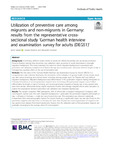2021-05-24Zeitschriftenartikel
Utilization of preventive care among migrants and non-migrants in Germany: results from the representative cross-sectional study ‘German health interview and examination survey for adults (DEGS1)’
Starker, Anne
Hövener, Claudia
Rommel, Alexander
Background
In Germany, different health checks for adults are offered for primary and secondary prevention. Previous findings indicate that preventive care utilization varies according to social determinants, especially migration background. This study examined the extent to which migration background is associated with preventive care utilization, independent of factors like age and socioeconomic status and whether length of stay in Germany has a positive effect on the use of preventive care.
Methods
The first wave of the ‘German Health Interview and Examination Survey for Adults’ (DEGS1) is a comprehensive data collection facilitating the description of the utilization of general health checks, dental check-ups, skin cancer screening, and cervical cancer screening among people aged 18–79 years with and without migration background. Migration background was differentiated in first-generation migrants having immigrated to Germany themselves or second-generation migrants born in Germany. First-generation migrants were further differentiated by length of stay in Germany, and second-generation migrants as having one or two parents who were born abroad. Multivariate binary logistic regression models with average marginal effects were calculated to analyse the associations between preventive care utilization and migration background.
Results
The sample comprised 7987 participants, 1091 of whom had a migration background. Compared with non-migrants, women and men with migration background— particularly first-generation migrants with length of stay <=20 years in Germany — make less use of preventive care. This association was observed statistically independent from sociodemographic factors. For dental check-ups a significantly lower use was also found for first-generation migrants who have lived in Germany for more than 20 years and second-generation of migrants with two parents born abroad. Post-model predictions showed that the utilization rates of first-generation migrants are gradually converging to the average values for non-migrants.
Conclusions
Our findings suggest inequalities in realized access to preventive care for first-generation migrants particularly for those who have lived in Germany for 20 years or less. Barriers to the utilization of preventive care may be addressed by informing migrant communities about preventive health care services at an early stage after immigration using migrant-sensitive information strategies.
Files in this item
Related Items
Show related Items with similar Title, Author, Creator or Subject.
-
2023-09-07ZeitschriftenartikelMental Health Surveillance in Deutschland Walther, Lena; Mauz, Elvira; Hölling, Heike; Thom, JuliaMit der Etablierung der psychischen Gesundheit als Public-Health-Thema wird auch ihre Surveillance (Überwachung) gefordert. Am Robert Koch-Institut ist daher eine Mental Health Surveillance für Deutschland im Aufbau. Die ...
-
2008-08-29Berichte und sonstige TexteReport: "Health in Germany" Robert Koch-InstitutLife expectancy is rising and the general health situation is good, but the number of people who smoke, are too fat, take too little exercise and/or drink too much alcohol is still too high. These are the main conclusions ...
-
2022-10-26Berichte und sonstige TexteNotaufnahmesurveillance Wochenbericht 01.01.2022 - 23.10.2022SUMO TeamSUMO ist ein am Robert Koch-Institut entwickeltes und betriebenes System, welches Gesundheitsdaten für Public Health-Surveillance verarbeitet und bereitstellt. Der Notaufnahmesurveillance Wochenbericht enthält Daten der ...

